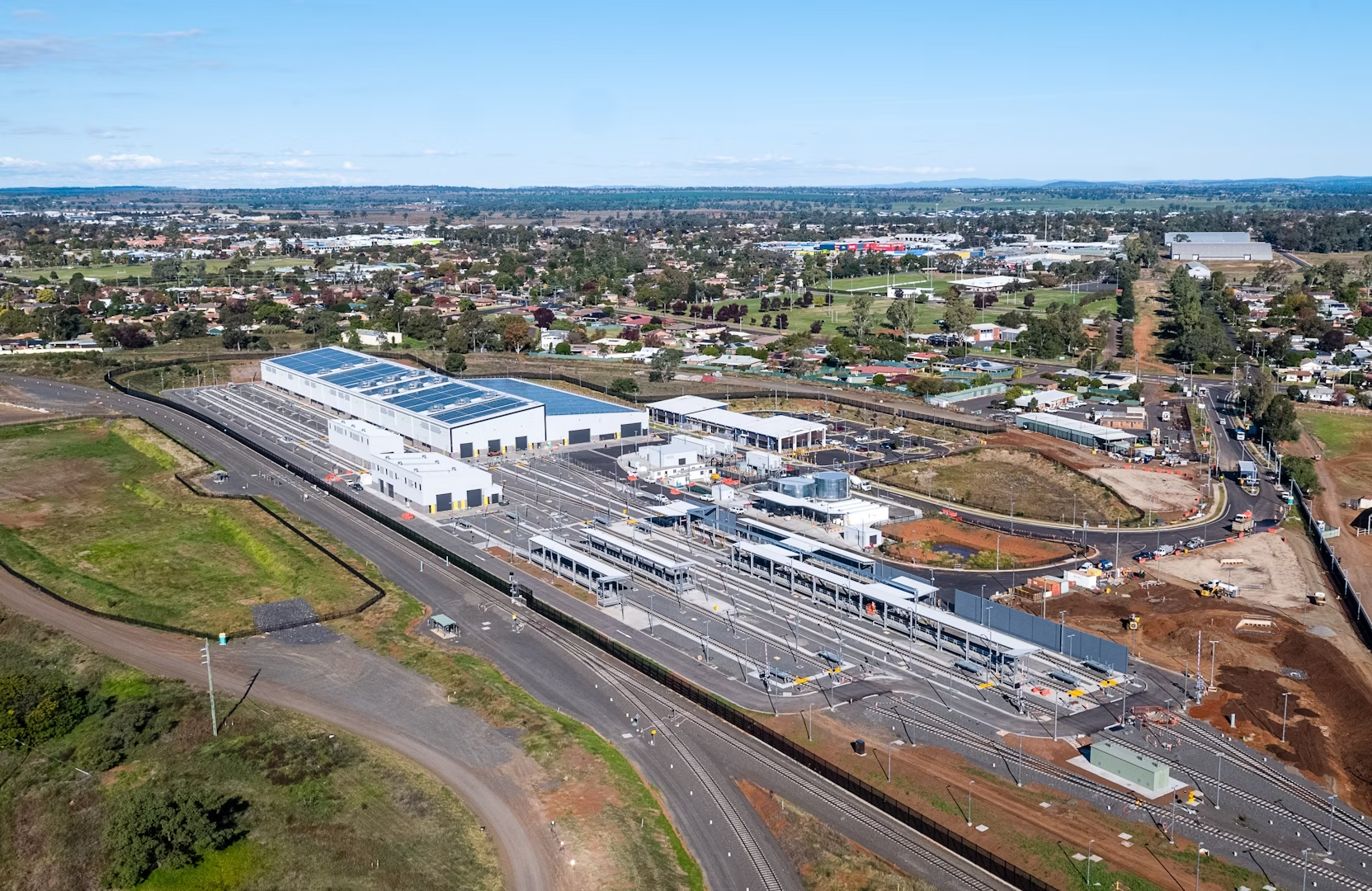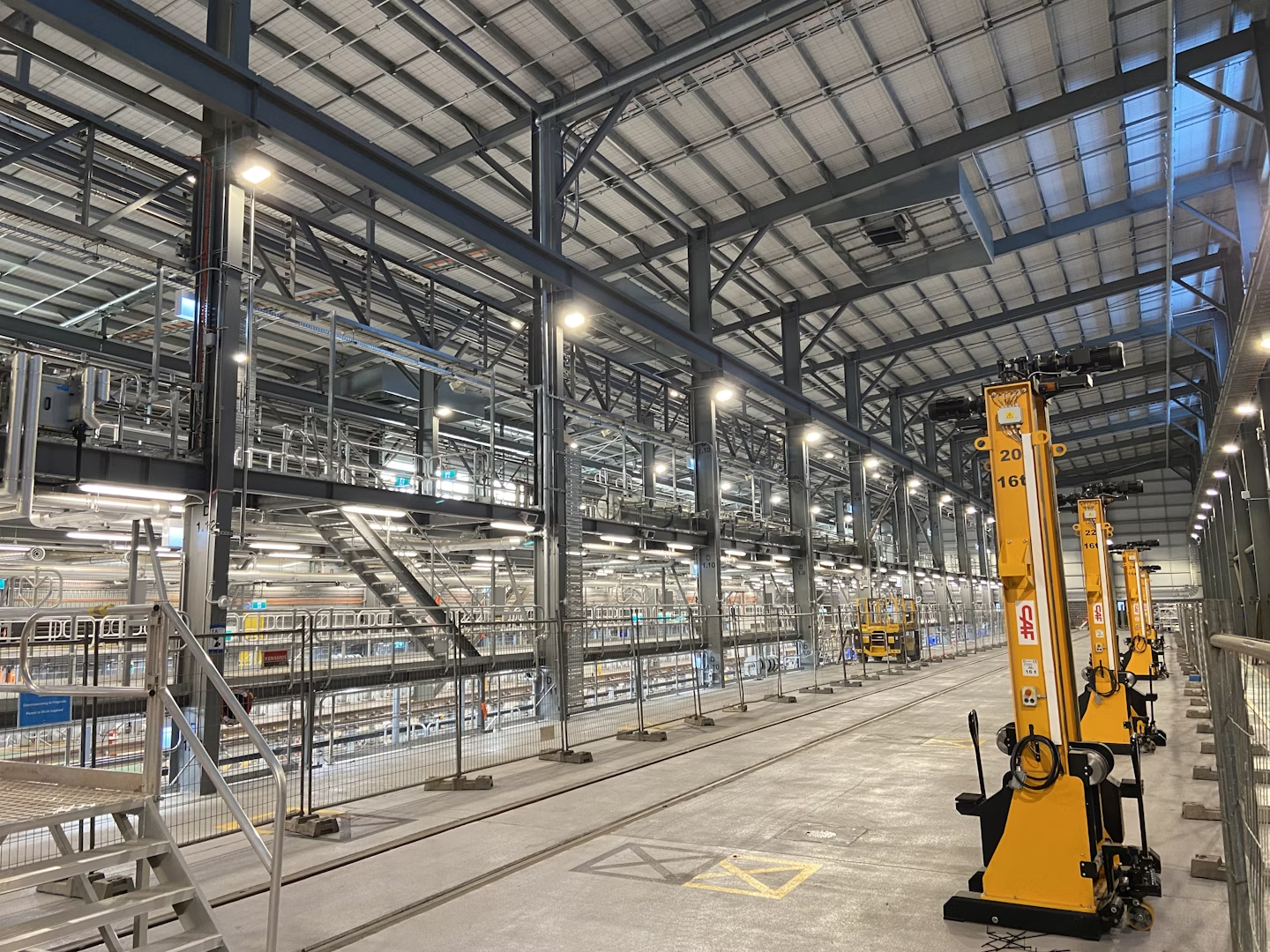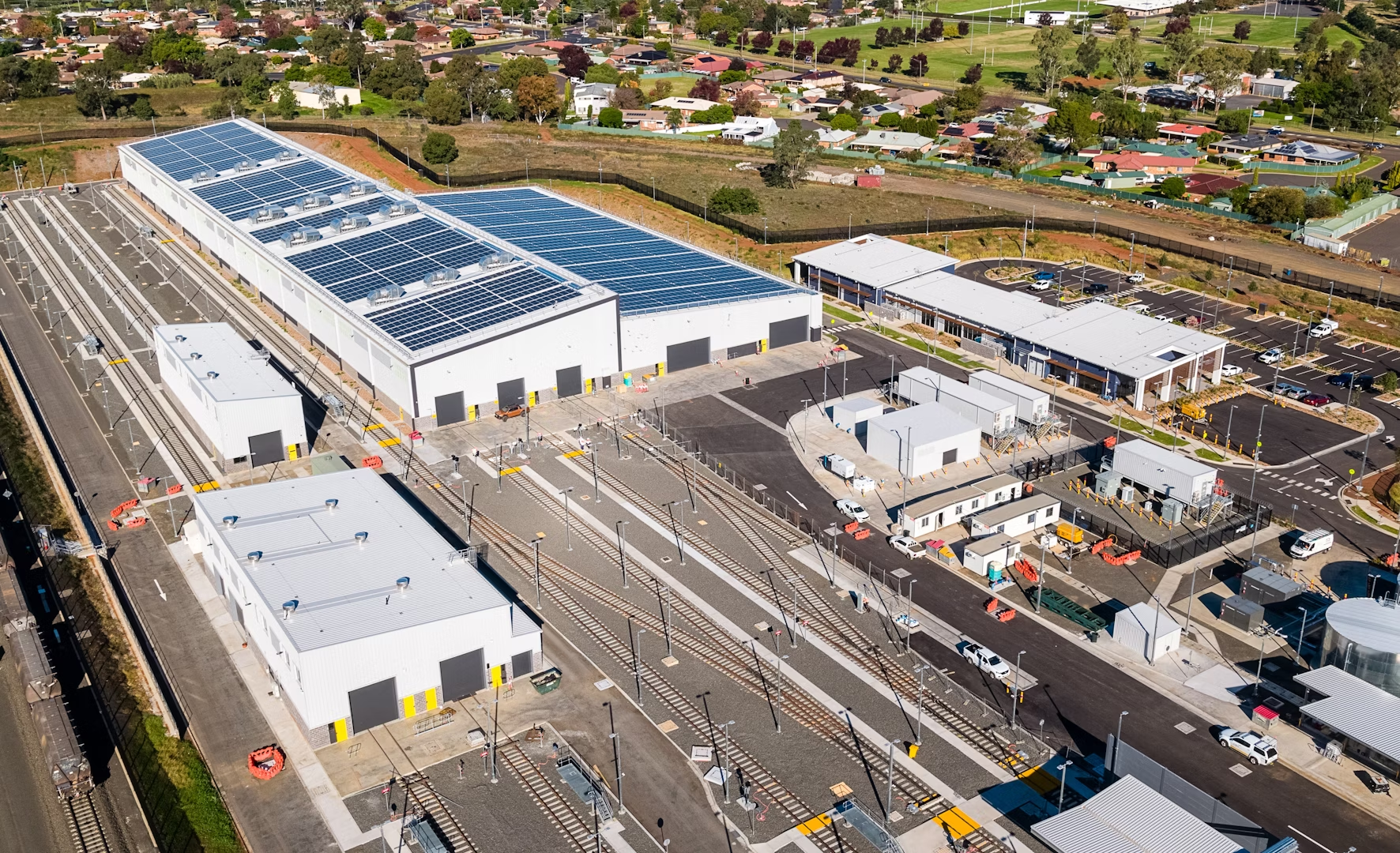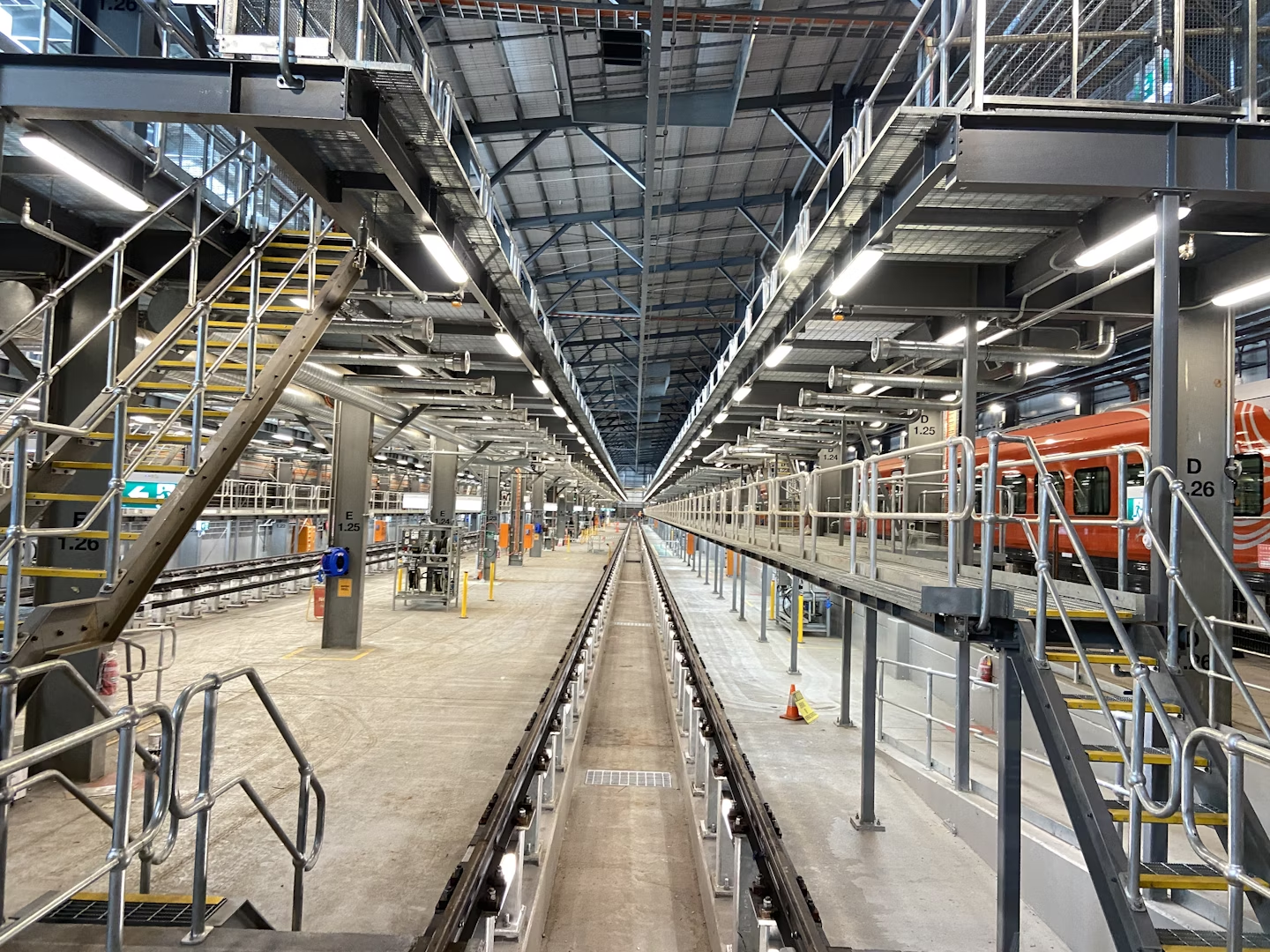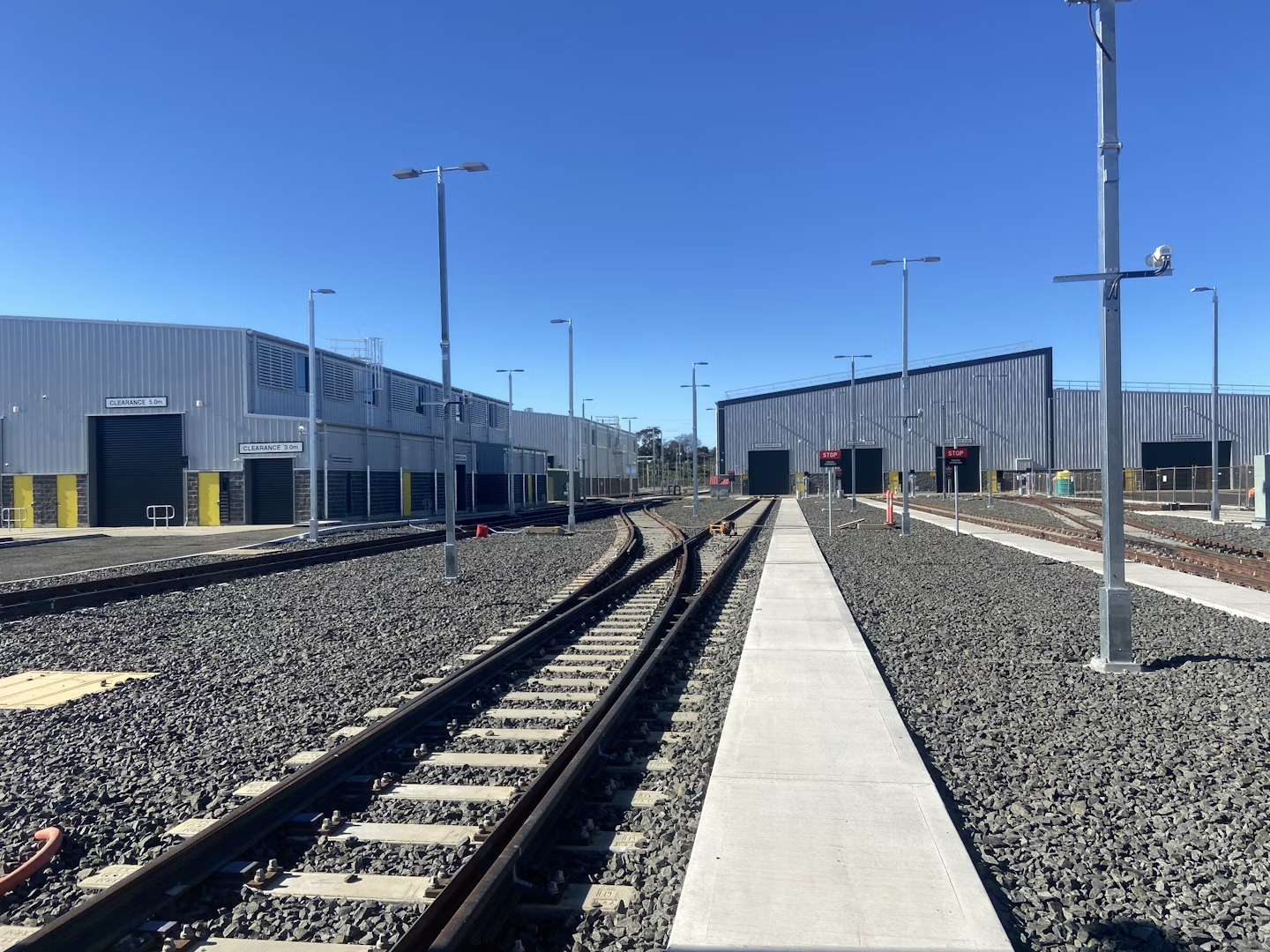Dubbo Mindyarra Regional Rail Maintenance Facility – Economic Outcomes
The Mindyarra Maintenance Centre in Dubbo, designed and built by CPB Contractors, is a cutting-edge train maintenance facility that marks a significant milestone in regional infrastructure. This world-class project underscores a commitment to renewable energy, socio-economic sustainability, and water conservation, delivering substantial benefits to the local community. The MMC has created numerous jobs, fostered skills development, and enhanced industry participation, setting new benchmarks for socio-economic outcomes. The Regional Rail Project has invigorated the regional economy by prioritising local workforce and business engagement, with notable participation from Aboriginal workers and businesses. Additionally, it has provided valuable training and apprenticeship opportunities, ensuring long-term benefits for the region. The facility’s innovative water recycling system meets all non-potable water needs sustainably, avoiding reliance on the Macquarie River. Achieving Net Zero for annual electricity demand, the MMC sets new standards in sustainability within the rail industry, contributing significantly to the state’s Net Zero energy goals.
Describe WHAT you have done and HOW you have done it. Please provide a summary of your initiative, innovation, or approach.
The Mindyarra Maintenance Centre (MMC) in Dubbo, regional NSW, sets a new benchmark in the sustainable design, delivery and operations of train maintenance facilities across Australia. It is a state-of-the-art facility that demonstrates a strong emphasis on renewable energy utilisation, principles of socio-economic sustainability, water conservation and circular economy principles that benefit the local regional community and future generations. This project not only supports local renewable energy capacity and avoids impacting local grid security and local water supply constraints, but also serves as a driving force for job creation, skills development, and industry participation, setting new standards for delivery of social and economic outcomes in our regions.
The project’s excellence in economic sustainability is multifaceted:
- Socio-economic benefits through procurement & JSIP programs
The project’s early commitment to socio-economic benefits was realised through strategic procurement and the Jobs, Skills, and Industry Participation (JSIP) program developed in consultation with key stakeholders. Initiatives such as the creation of a Job Portal, Pre-Employment Programs, tender writing workshops, and cultural awareness training were implemented to enhance local employment and business opportunities. Our approach involved strategic collaboration with local businesses, vocational training providers, and key stakeholders. This resulted in the development of valuable individuals with transferable skills and qualifications within the local regional workforce, fostering a resilient and sustainable local economy. The project also supported local businesses through the co-designed Business Support Catalogue and other initiatives aimed at promoting JSIP, such as assisting with tender submissions for large-scale projects, and strengthening the community’s economic foundation. - Onsite Renewable energy system
The project has installed an onsite renewable system capable of delivering 100% of the site’s annual electricity demand, system size determined through techno-economic analysis and whole of life decision-making, leading to installation of 3,243 solar photovoltaic panels reducing local grid reliance. This sustainable solution contributes to economic viability by ensuring a consistent, low-cost power supply, crucial for the operations phase economic sustainability. The system not only contributes to the reduction of greenhouse gas emissions but also to reducing the community’s social cost of carbon, a measure of economic damages caused by emitting one extra tonne of carbon emissions, into its economic benefits. - Sustainable construction practices
The project’s approach to construction embraced water conservation and circular economy principles, notably with the use of 100% non-potable water for operational demands and demands during construction, and 100% reuse of spoil. These practices contribute to limiting economic impacts of: (a) water scarcity in the drought prone regional NSW; and (b) waste to landfill generation and virgin material use, with the beneficial reuse of this material. The reuse of spoil at local facilities promoted the principle of circular economy by providing necessary backfill material that enabled expansion and ongoing operation of local businesses.
MMC set a new benchmark for delivering sustainable infrastructure in regional NSW, demonstrating how innovative practices can support Net Zero targets, enhance economic sustainability and contribute to the long-term economic prosperity of Dubbo.
What were the OUTCOMES and how were those outcomes shared?
Key economic sustainability outcomes: 1) JSIP improvements, 2) limiting economic impacts with the onsite renewable system, and 3) limiting economic impacts of water scarcity and supporting local businesses with circular economy practices.
1) JSIP Outcomes
The JSIP targets focused on the three key priority issues driving economic sustainability:
• Regional Job – to maximise the employment opportunities for the local regional communities. Key initiatives included creation of an online Jobs Portal to connect local job seekers with the regional job opportunities and engagement of 45 local businesses through the Industry Capability Network (ICN) to participate in the Project.
o 38% of the Workforce were employed in Sustainable Regional Jobs (ongoing employment of regional (mostly from the Dubbo LGA) person at a minimum 15 hr/week for at least 16 weeks).
o Of the above, 17% were Aboriginal workers
• Workforce Skills – to develop the skills base, capability, and transferable skills for the local regional community. Initiatives included implementation of two Pre-Employment Programs that provided accredited training programs such as Construction White Card, Plant Operating Tickets, Traffic Control, and etc.
o 19% of the Workforce participated in Workforce Skills Development
o 27% of trades across the Supply Chain were made up of Apprentices and 20% of apprentices were Aboriginal
• Industry Participation – to support regional NSW SMEs and Recognised Aboriginal businesses (RAB). Initiatives included partnership with ‘iclick2learn’ to facilitate workshops for regional businesses to prepare successful tender submissions, and CPB hosted tender writing workshops to assist SMEs/RABs for TfNSW projects.
o Over $142 million spent on ANZ SMEs
o Around $59 million spent on Regional NSW businesses
o Over $42 million spent on RAB
2) Renewable PV system
The facility is equipped with 3,243 solar panels (1.378 MWp), 172 times the size of the average residential solar installation and can meet 100% of the annual electricity demand of the facility during its operation. Any remaining energy demand will be sourced from renewable energy sources to ensure 100%.
The system not only contributes to the reduction of GHG emissions, but also to reducing the community’s social cost of carbon (SCC) which is estimated at $126/tCO2e for FY2024 by NSW Treasury (TPG23-08 Technical note).
Assuming the NSW Government’s Net Zero commitment by 2050, the system is estimated to reduce almost 6,000tCO2e until 2050 (annual decay of NSW grid emissions factors considered), meaning SCC reduction of ~AUD$744,500.
A recent US 2024 paper on the ‘Macroeconomic Impact of Climate Change” published by National Bureau of Economic Research placed a dramatically higher estimate at US$1,065 per tCO2e (i.e., over USD$6.2million), further highlighting the positive contribution the system can offer.
3) Water Conservation and Circular Economy principles
• Water conservation – Dubbo has historically experienced multiple droughts that led to significant impacts on agriculture and communities, and consequently economic impacts. It is challenging to quantify the true economic damage of droughts, but as an example, a $15million relief for water carting had been provided by the NSW Government during the 2019 drought in Dubbo as one of many fundings. Given the context, the principle of water conservation had been the core of the Project’s construction management and design, leading to:
o Reliance of non-potable water for dust suppression activities during construction (stormwater basins and minor use of bore-water), saving the same amount of water equivalent to more than 25 Olympic sized swimming pools
o Installation of train-wash system (capable of recycling 80% of its water use) and rainwater tank topped up by bore-water which can supply 100% of non-potable demand with non-potable sources.
Together, the Project was able to replace 85% of total water demand with non-potable sources across its lifecycle.
• Circular economy – reduction of construction waste to landfill was another core principle, leading to the following outcomes:
o Avoided almost 90% of construction and demolition waste from landfill, and more than 60% office waste from landfill
o Beneficially reused 100% of reusable spoil (around 500,000 tonnes), primarily offsite. CPB partnered with multiple local entities that received the spoil for beneficial reuse such as bedding/capping material for constructing new developments. For example, Fletchers Grain received around 55,000 tonnes of spoil to expand their operational footprint for development of more grain bunkers that would increase export, which effectively fosters to economic growth in the region.
Describe WHO benefited from your initiative, innovation, or approach?
The MMC has brought significant benefits to various stakeholders through its innovative and sustainable approach. These include:
Local Workforce and Community
• Employment Opportunities: The MMC project created numerous job opportunities for the local community. Through strategic procurement and the JSIP program, the project facilitated the employment of local workforce, including a significant percentage of Aboriginal people. This not only provided immediate employment but also contributed to long-term job sustainability in the region.
• Skills Development: The project implemented pre-employment programs and vocational training, enhancing the skills and qualifications of the local workforce. This included accredited training programs, and initiatives that helped develop a skilled labour force capable of contributing to future projects.
Local Businesses
• Economic Support: The MMC project supported local businesses through initiatives like the Business Support Catalogue and tender writing workshops. This enabled local SMEs and Recognised Aboriginal Businesses (RABs) to participate in large-scale projects, thereby strengthening the local economy.
• Circular Economy Practices: By reusing construction spoil and reducing waste, the project supported local businesses that benefited from these materials. For example, Fletchers Grain used the spoil to expand their operational footprint, fostering economic growth in the region.
Environmental and Economic Sustainability
• Renewable Energy: The renewable power generation of onsite 1.378MWp PV system reduces reliance on grid electricity, ensuring a consistent, low-cost power supply, thereby lowering operational costs for the Operator. This not only contributes to the reduction of GHG emissions but also provides economic benefits by reducing the social cost of carbon as discussed in Q2.
• Water Conservation: The project’s emphasis on water conservation, such as using non-potable water for dust suppression and installing a train-wash system capable of recycling 80% of its water use, helps mitigate the economic impacts to the local community due to potential event of water scarcity in the drought-prone region.
Broader Community and Future Generations
• Long-term Economic Prosperity: The MMC project set a new benchmark for sustainable infrastructure in regional NSW, demonstrating how innovative practices can enhance economic sustainability. This contributes to the long-term economic prosperity of Dubbo and serves as a model for future projects.
• Environmental Benefits: The project’s sustainable practices, including the reduction of greenhouse gas emissions and water conservation, provide long-term environmental benefits that will positively impact future generations.
In summary, the MMC project has provided substantial benefits to the local workforce, businesses, and the broader community by fostering economic growth, enhancing skills, supporting local businesses, and promoting environmental sustainability.
What LEGACY and UN SDG CONTRIBUTION was achieved?
The MMC has established a lasting legacy through its innovative and sustainable approach, significantly contributing to several United Nations Sustainable Development Goals (SDGs). By fostering economic and environmental sustainability with the initiatives discussed in the above sections, the MMC has created numerous job opportunities, enhanced skills development, supported local businesses, and contributed to reducing economic impacts of carbon and water scarcity. These efforts have set a new benchmark for sustainable infrastructure in regional NSW, ensuring long-term benefits for the local community and future generations.
The project has made substantial contributions to the following UN SDGs:
• SDG 4: Quality Education – The Project has made significant contributions to SDG 4 by implementing pre-employment programs and vocational training. These programs have enhanced the skills and qualifications of the local workforce, providing accredited training programs such as Construction White Card, Working at Heights, and Plant Operating Tickets. By developing a skilled labor force, the project has ensured that local residents are well-equipped to contribute to future projects, thereby promoting lifelong learning opportunities.
• SDG 5: Gender Equality – The MMC project has actively promoted gender equality by ensuring that employment opportunities and training programs are accessible to all, regardless of gender. The project’s commitment to diversity and inclusion has been reflected in its workforce composition, with a focus on providing equal opportunities for women and other underrepresented groups. This has contributed to the empowerment of women in the local community and promoted gender equality in the workforce.
• SDG 6: Clean Water and Sanitation – Water conservation has been a core principle of the MMC project, contributing significantly to SDG 6. The project’s use of non-potable water for dust suppression and the installation of a train-wash system capable of recycling 80% of its water use have ensured that water resources are used efficiently. Additionally, the reliance on non-potable water sources, such as stormwater basins and bore-water, has reduced the demand for potable water, thereby promoting sustainable water management practices.
• SDG 7: Affordable and Clean Energy – The MMC project’s renewable energy system has made substantial contributions to SDG 7. The installation of 3,243 solar photovoltaic panels has ensured that the facility can meet 100% of its annual electricity demand with renewable energy. This has not only reduced greenhouse gas emissions but also provided a consistent, low-cost power supply and reduced social cost of carbon, contributing to the economic viability of the project. By promoting the use of renewable energy, the MMC project has demonstrated the feasibility and benefits of clean energy solutions.
• SDG 8: Decent Work and Economic Growth – The MMC project has significantly contributed to SDG 8 by creating numerous job opportunities and fostering economic growth in the region. The strategic procurement and the JSIP program have facilitated the employment of local residents, including a significant percentage of Aboriginal workers. The project’s support for local businesses through initiatives like the Business Support Catalogue and tender writing workshops has strengthened the local economy. By promoting work opportunities and economic growth, the MMC project has contributed to the long-term economic prosperity of Dubbo.
In summary, the MMC project has left a lasting legacy and made significant contributions to several UN SDGs. By promoting economic and environmental sustainability, fostering skills development, and supporting local businesses, the project has set a new benchmark for sustainable infrastructure in regional NSW.


